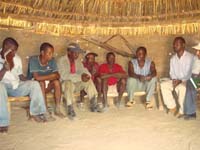Before you communicate
A method which is effective with one audience may not succeed with another. As the health communicator you always have to consider the following important factors before you communicate, when you are designing the message and identifying precisely who is your audience:
- Educational factors including the age and educational level of the audience are important. What kind of appeal might convince your audience? Pictures and diagrams that you use as teaching aids should relate to the culture of the audience and you should only use words that are used in everyday conversation.
- Sociocultural factors are important as you consider the beliefs of the audience about the topic of communication. What is the strength of the audience's present beliefs? What values does that audience hold? Can you find out whose opinions and views your audience trusts?
- Which patterns of communication already exist in the community and what are their rules during conversation in the community? How do they show respect when talking to another person? When is the best time to conduct your health education sessions, or the best place to put posters? Consider also the community dynamics including leadership patterns at the community level and what communication materials and skills are needed for interpersonal communication and counselling.
Several methods will help you reveal the lifestyles, health status, and other characteristics of an audience. These methods include observation, informal conversations, surveys (oral and written), in-depth interviews, focus groups — or a combination of these methods. Not every method is appropriate for every audience; for example, oral surveys may be appropriate for people with limited literacy skills, while focus groups may not be appropriate in particular cultures that traditionally do not share personal opinions or feelings in a small group setting.

Suppose Ms Ayesha is a health professional. She has a plan to teach the community of a village called Boke about HIV/AIDS. What are the factors that Ms Ayesha should consider about the audience before she starts health education or communication about HIV/AIDS?
Before she starts health education activities the first thing that Aysha should consider is the intended audience. This is because a method which is effective with one audience may not succeed with another. Some of the factors that should be considered are the age and educational level and literacy of the audience, the number of men and women in the audience, as well as the current beliefs of the audience about HIV/AIDS.